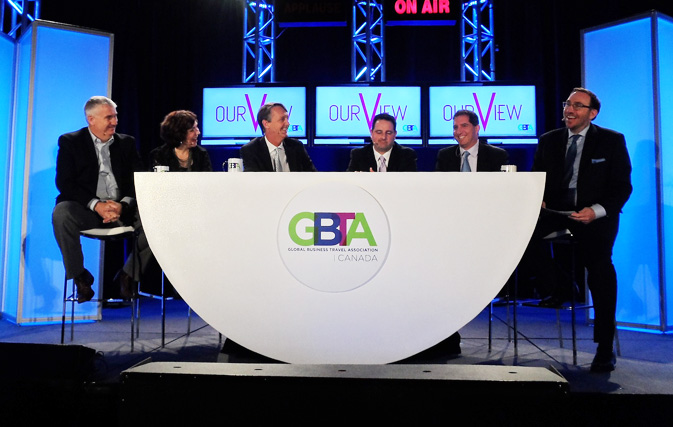TORONTO — Canada’s airline industry is stable with none of the seat dumping and $29 fares seen in markets like Europe. That’s not to say Canada’s two biggest airlines aren’t keeping an eye on upstarts like Jetlines, which hopes to launch service in Western Canada this summer, and Jet Naked. Both propose jet service with deeply discounted base fare models where ancillaries rule.
U.S. carrier Southwest is also said to be eyeing routes north of the border.
“It’s a capital-intensive marketplace and Canada is well-served already,” said Duncan Bureau, VP, Global Sales for Air Canada. “I think it would be a tough go. I don’t think Canada has room for another airline but time will tell.”
Bureau was joined by Lyell Farquharson, VP Sales & Business Development for WestJet, at a panel discussion at yesterday’s Global Business Travel Association conference in Toronto.
Farquharson said there are already more than 100 carriers in Canada, when you factor in all the regional airlines. “Good luck to anyone who wants to take that on,” he said.
Over 85% of airlines ever started in Canada are no longer in business, Farquharson added. It’s also an industry with huge overhead costs. “Last year was our best year ever and we made $14 per passenger.”
Farquharson said WestJet is seeing a slowdown because of the global impact on Canada’s oil and gas industries. “It’s real. Having said that, we see more departures out of Toronto than the West. We feel we’re balanced fairly well.”
Both Farquharson and Bureau have their eyes on Porter Airlines’ stronghold, Billy Bishop Toronto City Airport. “Running a dual hub in Toronto is expensive but you have to be where the travellers are. We’re also eagerly looking forward to the launch of the UP Express service to Pearson,” said Bureau.
Air Canada today operates to over 190 markets and by 2020 that number will increase to 250. Air Canada is also aiming for 50 million passengers by 2020, up from 38 million in 2014. Asked about fuel prices, Bureau said “the one thing I know about hedging is that whatever decision you make, it will be wrong. We’re getting kicked by the U.S. dollar. The biggest risk for us is that the U.S. dollar stays where it is and the cost of fuel goes up.”

